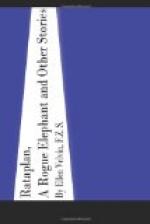Tera was a little uneasy all through that night, as Tranta did not return, but she took it very calmly. She had been growing indifferent to him lately, and the cares of her growing family were taking up all her attention.
As the days went on and Tranta did not appear, Tera forgot all about her husband, and devoted all her time and attention to her cubs.
She waited another week or two, and then, after studying their size and strength, she concluded that it was quite time to teach them how to hunt and kill for themselves. So, to the cubs’ great joy, they were allowed that same evening to accompany their mother on a hunting expedition.
Tera was a good mother, and took great pains in teaching them how to walk, where to walk, and when to walk; how to draw in their fur in times of danger; how to hide themselves in the long, jungle grass until it was difficult to tell which was grass and which was tiger; taught them, in fact, all the accomplishments necessary to make them good Bengal tigers. Their own instincts told them the rest, and they proved very apt pupils.
Softly and silently Terra’s supple body wended through the tangled undergrowth of the jungle, followed by the four cubs, who growled, whimpered and gamboled about like so many kittens.
At last the cubs began to get tired. It was just when they were thinking of refusing to go any farther that Tera told them—in tiger language—that here was the end of their journey. Crouching softly with her head on her paws, her fierce, yellow eyes fixed on some moving objects in front of her, and her lips and whiskers moving excitedly, Tera told them to look.
They had come to the end of the jungle now, and facing them was an open field. In the field were seven or eight young calves—the very things on which to teach young tigers how to kill. Telling her little ones to watch her, Tera, with one mighty bound, sprang at the nearest calf, bringing him to the ground with the force of the blow. She alighted full on the back of the calf, and her long teeth fastened themselves in its poor, quivering throat.
It was soon over, and, almost before the calf was dead, the four cubs, fired by the sight of blood and their mother’s example, sprang, with cruel ferocity on the carcass, and tore and dragged it to pieces.
[Illustration: “TERA SPRANG AT THE NEAREST CALF, BRINGING HIM TO THE GROUND.”]
But Tera had not brought them there simply to eat. Her part was to teach them to kill, so, administering a sharp pat to each, she made them leave the body of the calf and attempt a little killing for themselves.
At first the cubs grumbled and growled, and even scolded their mother in their anger, but, in a very short time, they grew just as excited over the killing process as they had been over the eating, and, although one calf would have been enough to last them for days, they never rested until every one of the little animals was dead, for the killing had aroused all their savage instincts.




